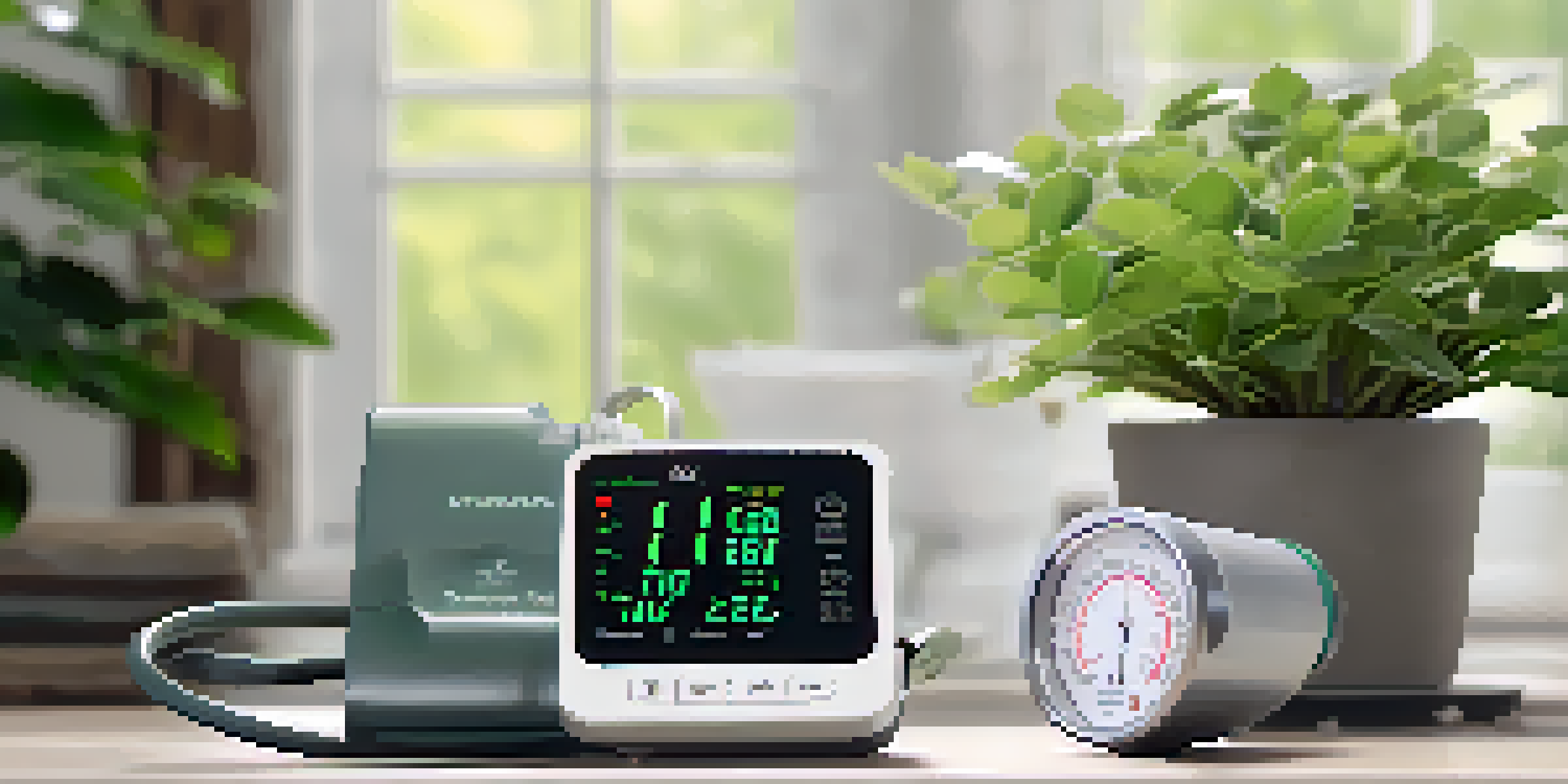Healthy Aging: The Importance of Regular Blood Pressure Checks

Understanding Blood Pressure and Its Importance
Blood pressure is the force of blood pushing against your artery walls. It's crucial for delivering oxygen and nutrients throughout your body. When this pressure is too high or too low, it can lead to serious health issues, especially as we age.
The greatest wealth is health.
Regular monitoring of blood pressure can help catch potential problems early. High blood pressure, or hypertension, often goes unnoticed because it presents no symptoms. This is why routine checks are essential for maintaining overall health as you grow older.
By keeping an eye on your blood pressure, you can take proactive steps to prevent complications like heart disease and stroke. Simple lifestyle changes, such as a healthier diet and regular exercise, can make a significant difference in managing your levels.
How Aging Affects Blood Pressure
As we age, our blood vessels can become stiffer and less elastic, leading to higher blood pressure. This natural change in our bodies means that older adults need to be more vigilant about their heart health. Understanding how age influences blood pressure is vital for effective management.

Additionally, hormonal changes and other age-related factors can impact our blood pressure levels. For instance, medications for other health issues may also affect how your blood pressure behaves. Awareness of these factors can empower individuals to seek help when needed.
Blood Pressure Monitoring is Essential
Regularly checking your blood pressure helps catch potential health issues early, particularly as you age.
Embracing a healthy lifestyle is especially important for older adults. Regular physical activity, a balanced diet, and stress management can help maintain healthy blood pressure, supporting overall well-being as you age.
The Risks of Neglecting Blood Pressure Checks
Ignoring blood pressure checks can lead to severe consequences, including heart failure, kidney disease, and vision loss. These risks underscore the importance of making blood pressure monitoring a routine part of your healthcare. It's not just about numbers; it's about your quality of life.
An ounce of prevention is worth a pound of cure.
Many individuals may feel perfectly fine, but that doesn’t mean their blood pressure is within the healthy range. This false sense of security can lead to neglect, making regular checks even more critical. Remember, prevention is always better than cure.
By staying informed and regularly checking your blood pressure, you are taking a crucial step in safeguarding your health. This simple act can significantly reduce the risk of life-altering health issues down the line.
How to Monitor Blood Pressure at Home
Monitoring your blood pressure at home is easier than you might think. With the right equipment, like an automatic blood pressure monitor, you can keep track of your readings without needing a doctor's visit every time. This convenience allows for regular monitoring in a comfortable setting.
To get accurate readings, it’s essential to follow a few simple guidelines. Make sure to measure your blood pressure at the same time each day, sit quietly for a few minutes before taking a reading, and avoid caffeine or exercise beforehand. This consistency will help you understand your baseline levels.
Lifestyle Changes Improve Health
Adopting heart-healthy habits like exercise and a balanced diet can significantly help manage blood pressure.
Keeping a log of your readings can also be valuable. Sharing this information with your healthcare provider will help them make informed decisions about your health and necessary interventions.
Lifestyle Changes for Healthy Blood Pressure
Adopting a heart-healthy lifestyle can have a profound impact on your blood pressure. Incorporating regular physical activity, such as walking or swimming, can help lower your blood pressure and improve your overall heart health. Aim for at least 150 minutes of moderate exercise each week.
Diet plays a crucial role in managing blood pressure as well. Eating plenty of fruits, vegetables, whole grains, and lean proteins while reducing sodium intake can lead to significant improvements. The DASH (Dietary Approaches to Stop Hypertension) diet is a great example of a plan focused on heart health.
Moreover, managing stress through mindfulness practices, such as yoga or meditation, can also help maintain healthy blood pressure levels. Remember, it’s about creating a balanced approach to your well-being.
When to Seek Medical Advice
If you notice consistently high blood pressure readings or experience symptoms like headaches, dizziness, or shortness of breath, it’s time to consult a healthcare professional. Early intervention can prevent more serious health issues down the line. Don't hesitate to reach out if something feels off.
Regular check-ups are essential, particularly for older adults or those with a family history of hypertension. Your doctor can provide personalized advice based on your health history and current lifestyle. They can also help you set realistic goals for managing your blood pressure.
Seek Help for High Readings
If you notice consistently high blood pressure or symptoms like dizziness, consulting a healthcare professional is crucial.
Staying proactive about your health means being aware of your body and seeking help when needed. Remember, it's never too late to make positive changes and prioritize your well-being.
Conclusion: Prioritizing Blood Pressure for Healthy Aging
Healthy aging involves making informed choices about your health, and regular blood pressure checks are a key component. By prioritizing these checks, you can catch potential issues early and take proactive measures to maintain your well-being. It's all about creating a foundation for a healthier future.
As you navigate the aging process, remember the importance of lifestyle choices and regular check-ups. Each small step you take can lead to significant improvements in your health and quality of life. Embrace the journey of aging with confidence.

Incorporating these practices into your routine can empower you to take charge of your health. Healthy aging is not just a goal; it's a lifelong journey that begins with awareness and action.